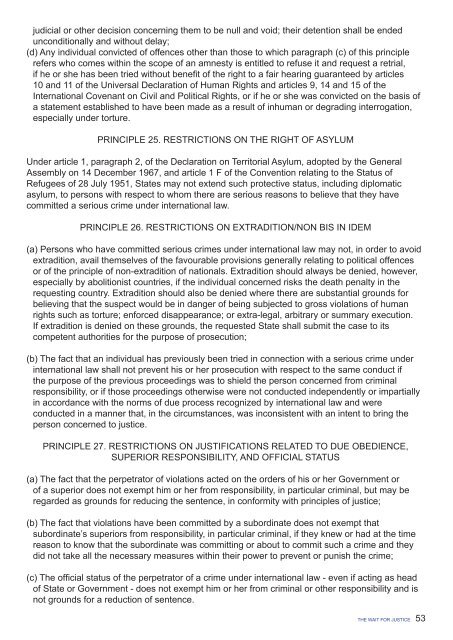The Commissioners of LLRC
The Commissioners of LLRC
The Commissioners of LLRC
Create successful ePaper yourself
Turn your PDF publications into a flip-book with our unique Google optimized e-Paper software.
judicial or other decision concerning them to be null and void; their detention shall be ended<br />
unconditionally and without delay;<br />
(d) Any individual convicted <strong>of</strong> <strong>of</strong>fences other than those to which paragraph (c) <strong>of</strong> this principle<br />
refers who comes within the scope <strong>of</strong> an amnesty is entitled to refuse it and request a retrial,<br />
if he or she has been tried without benefit <strong>of</strong> the right to a fair hearing guaranteed by articles<br />
10 and 11 <strong>of</strong> the Universal Declaration <strong>of</strong> Human Rights and articles 9, 14 and 15 <strong>of</strong> the<br />
International Covenant on Civil and Political Rights, or if he or she was convicted on the basis <strong>of</strong><br />
a statement established to have been made as a result <strong>of</strong> inhuman or degrading interrogation,<br />
especially under torture.<br />
PRINCIPLE 25. RESTRICTIONS ON THE RIGHT OF ASYLUM<br />
Under article 1, paragraph 2, <strong>of</strong> the Declaration on Territorial Asylum, adopted by the General<br />
Assembly on 14 December 1967, and article 1 F <strong>of</strong> the Convention relating to the Status <strong>of</strong><br />
Refugees <strong>of</strong> 28 July 1951, States may not extend such protective status, including diplomatic<br />
asylum, to persons with respect to whom there are serious reasons to believe that they have<br />
committed a serious crime under international law.<br />
PRINCIPLE 26. RESTRICTIONS ON EXTRADITION/NON BIS IN IDEM<br />
(a) Persons who have committed serious crimes under international law may not, in order to avoid<br />
extradition, avail themselves <strong>of</strong> the favourable provisions generally relating to political <strong>of</strong>fences<br />
or <strong>of</strong> the principle <strong>of</strong> non-extradition <strong>of</strong> nationals. Extradition should always be denied, however,<br />
especially by abolitionist countries, if the individual concerned risks the death penalty in the<br />
requesting country. Extradition should also be denied where there are substantial grounds for<br />
believing that the suspect would be in danger <strong>of</strong> being subjected to gross violations <strong>of</strong> human<br />
rights such as torture; enforced disappearance; or extra-legal, arbitrary or summary execution.<br />
If extradition is denied on these grounds, the requested State shall submit the case to its<br />
competent authorities for the purpose <strong>of</strong> prosecution;<br />
(b) <strong>The</strong> fact that an individual has previously been tried in connection with a serious crime under<br />
international law shall not prevent his or her prosecution with respect to the same conduct if<br />
the purpose <strong>of</strong> the previous proceedings was to shield the person concerned from criminal<br />
responsibility, or if those proceedings otherwise were not conducted independently or impartially<br />
in accordance with the norms <strong>of</strong> due process recognized by international law and were<br />
conducted in a manner that, in the circumstances, was inconsistent with an intent to bring the<br />
person concerned to justice.<br />
PRINCIPLE 27. RESTRICTIONS ON JUSTIFICATIONS RELATED TO DUE OBEDIENCE,<br />
SUPERIOR RESPONSIBILITY, AND OFFICIAL STATUS<br />
(a) <strong>The</strong> fact that the perpetrator <strong>of</strong> violations acted on the orders <strong>of</strong> his or her Government or<br />
<strong>of</strong> a superior does not exempt him or her from responsibility, in particular criminal, but may be<br />
regarded as grounds for reducing the sentence, in conformity with principles <strong>of</strong> justice;<br />
(b) <strong>The</strong> fact that violations have been committed by a subordinate does not exempt that<br />
subordinate’s superiors from responsibility, in particular criminal, if they knew or had at the time<br />
reason to know that the subordinate was committing or about to commit such a crime and they<br />
did not take all the necessary measures within their power to prevent or punish the crime;<br />
(c) <strong>The</strong> <strong>of</strong>ficial status <strong>of</strong> the perpetrator <strong>of</strong> a crime under international law - even if acting as head<br />
<strong>of</strong> State or Government - does not exempt him or her from criminal or other responsibility and is<br />
not grounds for a reduction <strong>of</strong> sentence.<br />
THE WAIT FOR JUSTICE 53


